Energy drink addiction signs, symptoms and treatments
Table of content
- What is energy drink addiction?
- What are the causes of energy drink addiction?
- What are the effects of energy drink addiction?
- What are the signs and symptoms of energy drink addiction?
- How to overcome energy drink addiction?
- What are the risk factors for energy drink addiction?
- How do you treat energy drink addiction?
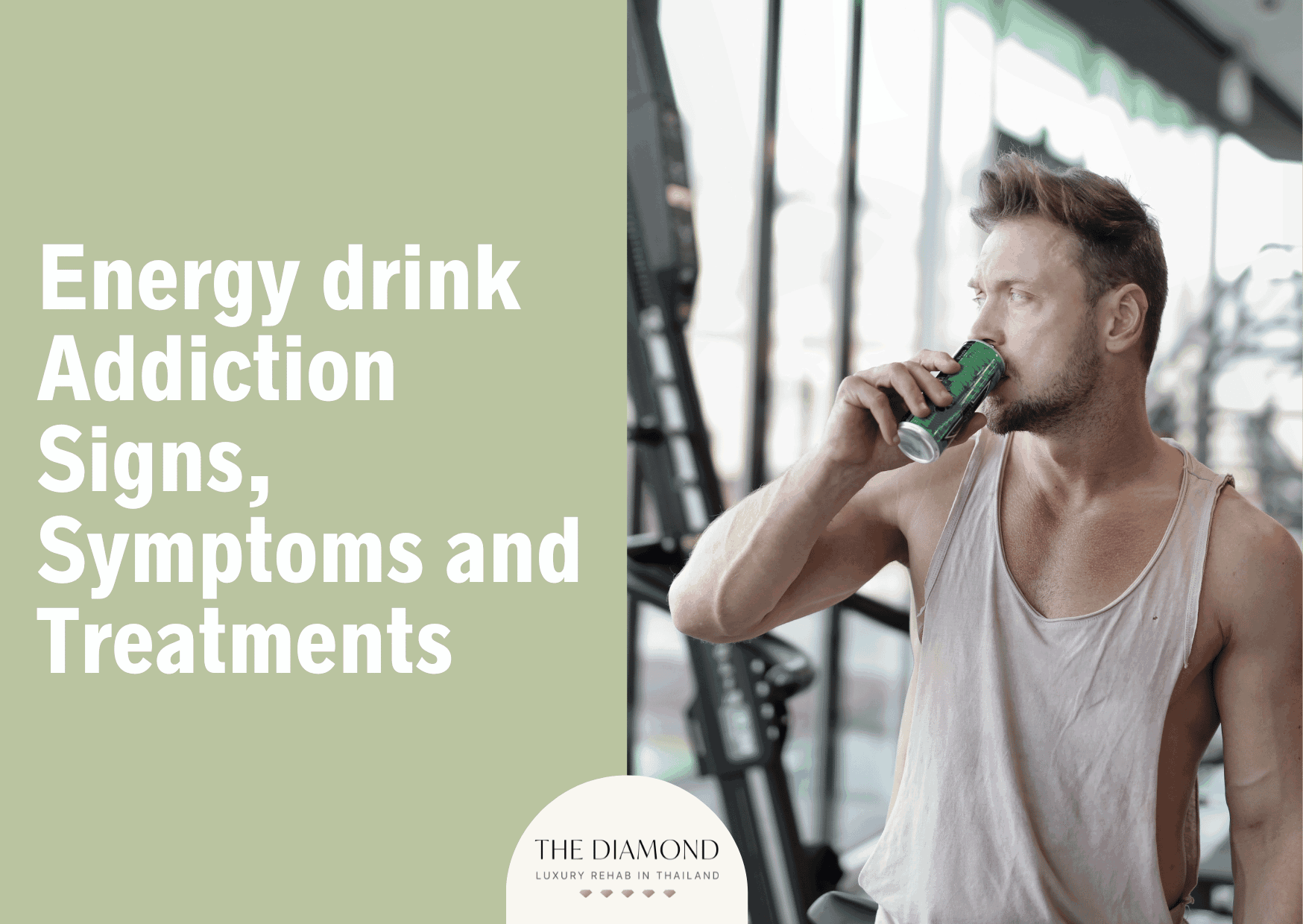
Energy drink addiction is the compulsive urge to keep drinking these beverages despite the harm they cause. Many people believe they can’t do various tasks without energy drinks to lift them up first.
The most common symptoms of energy drink addiction are excessive use of these beverages, irritable mood when not using them, withdrawal symptoms, and spending a lot of money on buying these products. The causes of this addiction can be psychological, social, and biological. Risk factors include young age, being a male, and having a history of substance use disorders.
Effects of energy drink addiction on health and quality of life are numerous. They range from increased risk of weight gain, dental problems, and cardiovascular problems, to financial difficulties.
What is energy drink addiction?
Energy drink addiction is the excessive, or compulsive, drinking of energy beverages without being able to control the consumption. It’s a type of food addiction. At this point, there is no official definition for energy drink addiction, unlike cocaine addiction and other forms of substance abuse.
However, addiction itself is a psychological condition indicated by a strong desire to keep using the addictive agent, despite the negative consequences. The use of energy drinks is prevalent across the globe. These beverages contain a lot of sugar and caffeine, which is their main stimulant.
The greatest danger of energy drink addiction is that many people combine these beverages with alcohol. Although they perceive it as a harmless thing to do, a combination of energy drinks and alcohol increases the risk of side effects and other health concerns. It also leads to risky behaviors. Additionally, energy drink addiction increases the risk of developing substance use disorders.
What are the causes of energy drink addiction?
The causes of energy drink addiction involve potential factors that contribute to the condition. The causes of energy drink addiction are listed below:
- Biological causes: Energy drinks are laden in caffeine and sugar, which can release high amounts of the feel-good neurotransmitter dopamine. With chronic and excessive use, dopamine receptors weaken, meaning you need more of the addictive agent to experience the same effects. This creates a vicious cycle that leads to addiction.
- Psychological causes: Some people believe they’re unable to do their job, complete a workout in the gym, study for exams, or do other activities if they don’t drink energy beverages. The presence of other mental health problems can also contribute to the development of energy drink addiction.
- Social causes: Spending a lot of time in social groups with high consumption of energy drinks may lead to overconsumption that ends with tolerance, dependence, and addiction. Many adolescents succumb to peer pressure and start consuming energy drinks excessively. Others mix them with alcohol, hoping it’s a safer alternative. All these behaviors can lead to addiction.
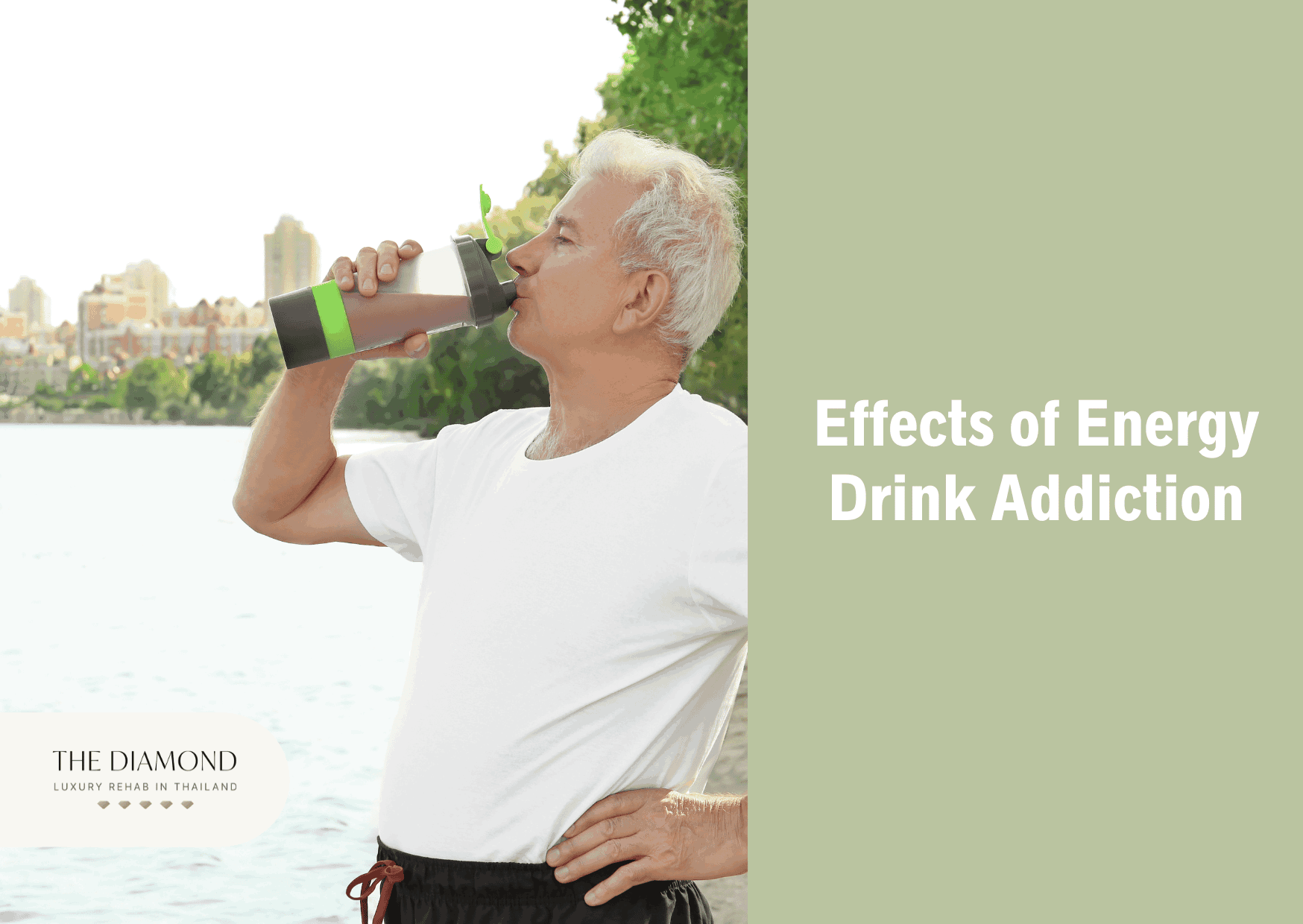
What are the effects of energy drink addiction?
The effects of energy drink addiction are numerous and have a major impact on a person’s health and wellbeing. The effects of energy drink addiction are listed below:
- Physical effects: weight gain, dehydration, insomnia
- Cardiovascular effects: heart disease, arterial dilatation, aneurysm formation, dissection, and rupture of large arteries
- Dental effects: teeth discoloration, wearing out enamel, tooth decay, cavities
- Renal effects: enhanced diuresis, increased risk of kidney disorders
- Gastrointestinal and metabolic effects: decreased insulin sensitivity, metabolic syndrome, type 2 diabetes, gastrointestinal issues
- Psychological effects: violent behavior, stress
- Short-term effects: increased heart rate, restlessness, nausea, vomiting, convulsions
- Long-term effects: impaired blood pressure and heart rhythm, slow metabolism, negative changes in weight, blood glucose levels, and cholesterol
- Beneficial effects: improved memory, increased alertness, enhanced athletic endurance, and elevated mood
What are the signs and symptoms of energy drink addiction?
The signs and symptoms of energy drink addiction are indicators that suggest an individual may be getting hooked on energy drinks. The most common signs and symptoms of energy drink addiction include:
- Strong cravings for energy drinks
- Inability to reduce the number of energy drinks consumed
- Unsuccessful attempts to stop
- Spending a lot of time thinking about drinking energy beverages or obtaining them
- Consuming multiple energy drinks throughout the day
- Irritability, mood swings, and other negative thoughts and behaviors when not drinking energy beverages
- Late for work/school due to the need to purchase energy drinks
- Spending a lot of money on these beverages
- Family and friends complain about a person’s energy drink use
- Drinking energy drinks with almost all meals
- Strong belief it’s impossible to get any work done and focus without energy drinks
Other possible symptoms of energy drink addiction are listed below:
- Fatigue despite drinking a lot of energy drinks, due to tolerance to caffeine
- Sleep disturbances
- Muscle twitching and stomach aches
- Drinking more energy drinks than water
How to overcome energy drink addiction?
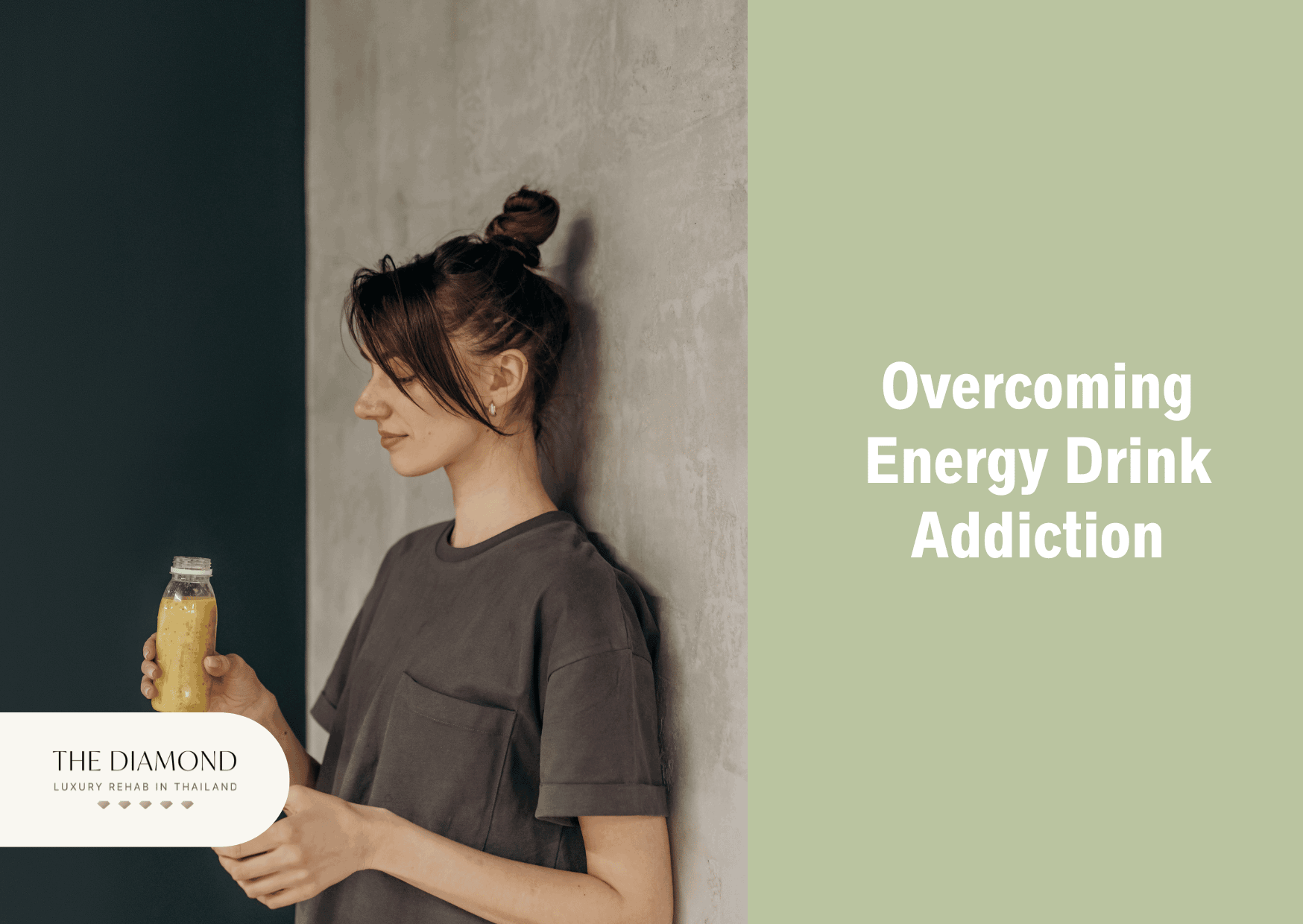
In order to overcome energy drink addiction, it’s useful to replace those beverages with healthier alternatives, which are free of sugar, caffeine, and other stimulants. These include herbal or fruit teas, kombucha or fermented tea, green tea, unsweetened sparkling water, and decaf coffee.
Treatment for energy drink addiction is also necessary in many cases. Family and friends should encourage the affected person to receive help without judging. However, there’s a lot a person can do on their own to support their recovery process.
One of those things is to shift their thought process. As soon as the craving for energy drinks emerges, it is important to distance oneself from the environment or the thought. Distracting activities such as short walks can do the trick.
An important strategy to overcoming energy drink addiction is to avoid having these beverages in the household or socializing with persons who use them. Creating a support system and stress management are also important techniques to overcome this form of addiction.
What are the risk factors for energy drink addiction?
Risk factors for energy drink addiction are conditions or circumstances that increase the likelihood of an individual developing an addiction to energy drinks. The biggest risk factors for energy drink addiction are the following:
- Young age (adolescence, young adulthood)
- History of addiction
- Mental health problems
- Being male
- Socializing with people who frequently consume energy drinks
- Stress
- Constantly high workloads and tight deadlines
- Engagement in drug or alcohol use
- Heavy exposure to energy drinks marketing content
- Taking part in hobbies or sports sponsored by energy drink brands
How do you treat energy drink addiction?
Energy drink addiction is treated, like other types of addiction, with detox and rehab, which also includes therapy. The first stage of the treatment process is detox, when a person stops using the addictive agent. This is the part when withdrawal symptoms may occur.
Detox is usually performed in a medically supervised setting in a rehab center. Patients may receive medications if their withdrawal symptoms are severe. Although pharmaceutical therapy for energy drink addiction doesn’t exist, some medications may help alleviate the symptoms of withdrawal.
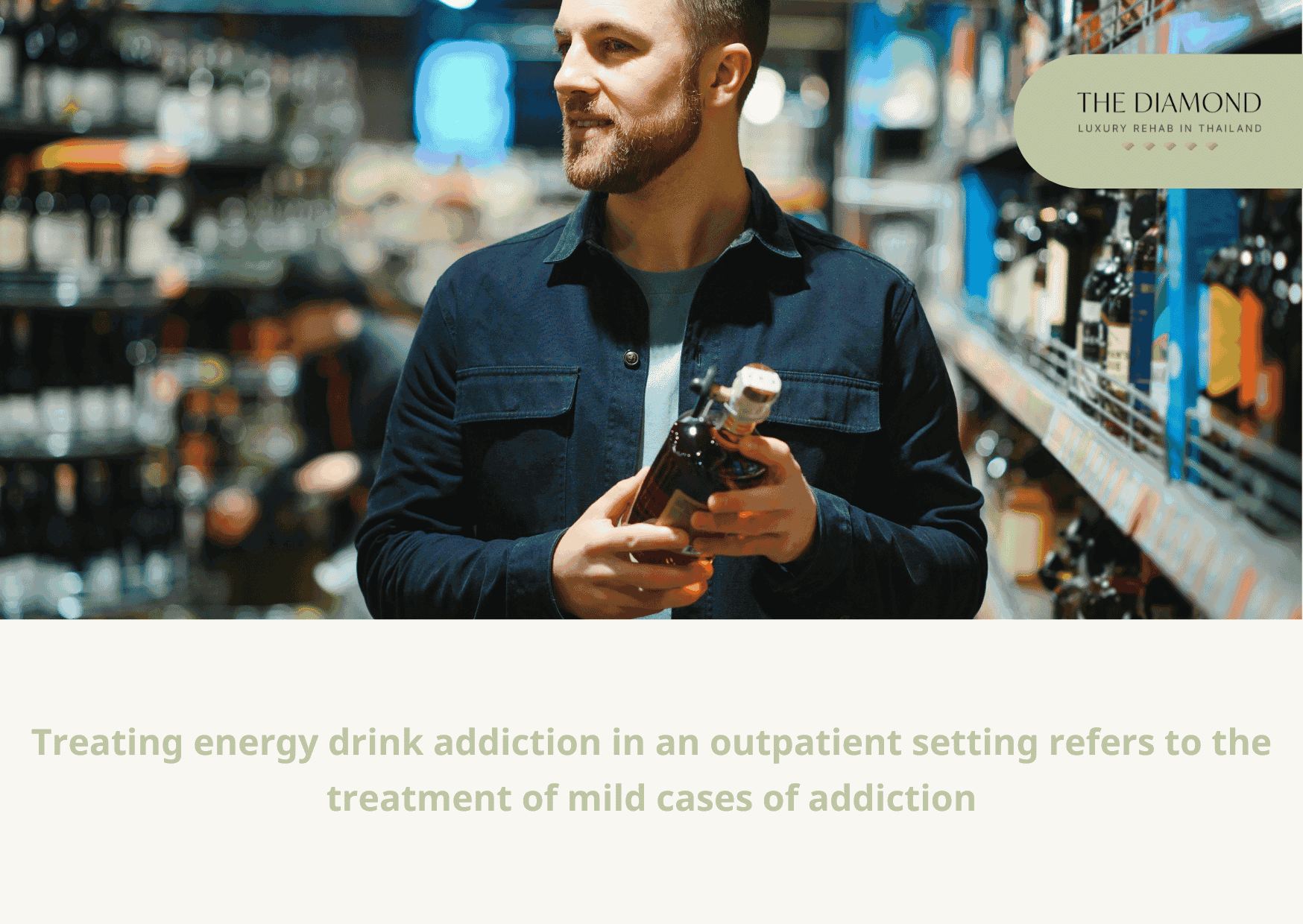
Rehab treatment can be inpatient and outpatient. Treating energy drink addiction in an outpatient setting refers to the treatment of mild cases of addiction. It’s also a reasonable option for persons who complete inpatient programs and want more guidance or support. On the other hand, the inpatient or residential program requires patients to sleep and live in the treatment center for 60 or 90 days.
The core of both types of programs is therapy. Various therapy approaches can help persons with energy drink addiction, but cognitive-behavioral therapy (CBT) is the most common.
A 2010 study by McHugh et al., published in the Psychiatric Clinics of North America confirms the effectiveness of CBT in addiction treatment and shows this therapy captures various behavioral treatments, including those that focus on the learning process and motivational obstacles that hinder improvement.
During the therapy sessions, a patient learns to identify triggers of the compulsive behavior as well as recognize negative thoughts and behavior patterns. At the same time, they replace those negative behaviors and thoughts with more positive alternatives.
The main goal of energy addiction treatment is to help patients learn to cope and develop mechanisms to resist cravings and prevent or avoid relapse after treatment. During treatment, patients work on managing self-destructive behavior and also improve their confidence and self-esteem.
Why is energy drink addictive?
Energy drink is addictive because it causes the brain to release dopamine, the feel-good hormone. Energy drinks are beverages that contain high amounts of sugar, caffeine, and other stimulants. The most common uses of these drinks are to increase physical performance, improve mental alertness, and boost energy levels.
People often take these drinks in order to be more productive. In fact, those are the most significant advantages of these beverages. They do have the potential to increase mental alertness and energy levels. However, there are a lot more disadvantages. The energy-boosting effects of these beverages are short-term, but they also have numerous side effects, including gastrointestinal upset, sleep problems, tremors, and anxiety.
Reasons behind the addictive nature of energy drinks revolve around caffeine. A 2011 study on the high risk of energy drinks from JAMA suggested that the notion that caffeine’s neuropharmacologic effects could contribute to the propensity for addiction is probably the most alarming. Additionally, persons who drink these beverages also tend to mix them with alcohol, which further contributes to risky behaviors.
In the case of energy drink addiction, the brain and the nervous system of the addicted person require a constant intake of caffeine in order to function properly.
When is energy drink addiction counseling necessary?
Energy drink addiction counseling is necessary when a person’s energy drinking habits become worrisome. Counseling is not just for addiction itself. This approach could help persons with problematic behaviors before they become addicted.
If you, or someone you know, exhibit signs and symptoms mentioned above, it’s useful to consider counseling. Or, if their need for energy drinks becomes more intense, they may want to try counseling (or recommend it to someone) before it develops into a much bigger problem.
In persons with energy drink addiction, counseling is a great option once a person recognizes signs of the problem and is ready to acknowledge it. Counseling helps cope with addiction and encourages a patient on the road to successful recovery.
What are the symptoms of energy drink addiction withdrawal?
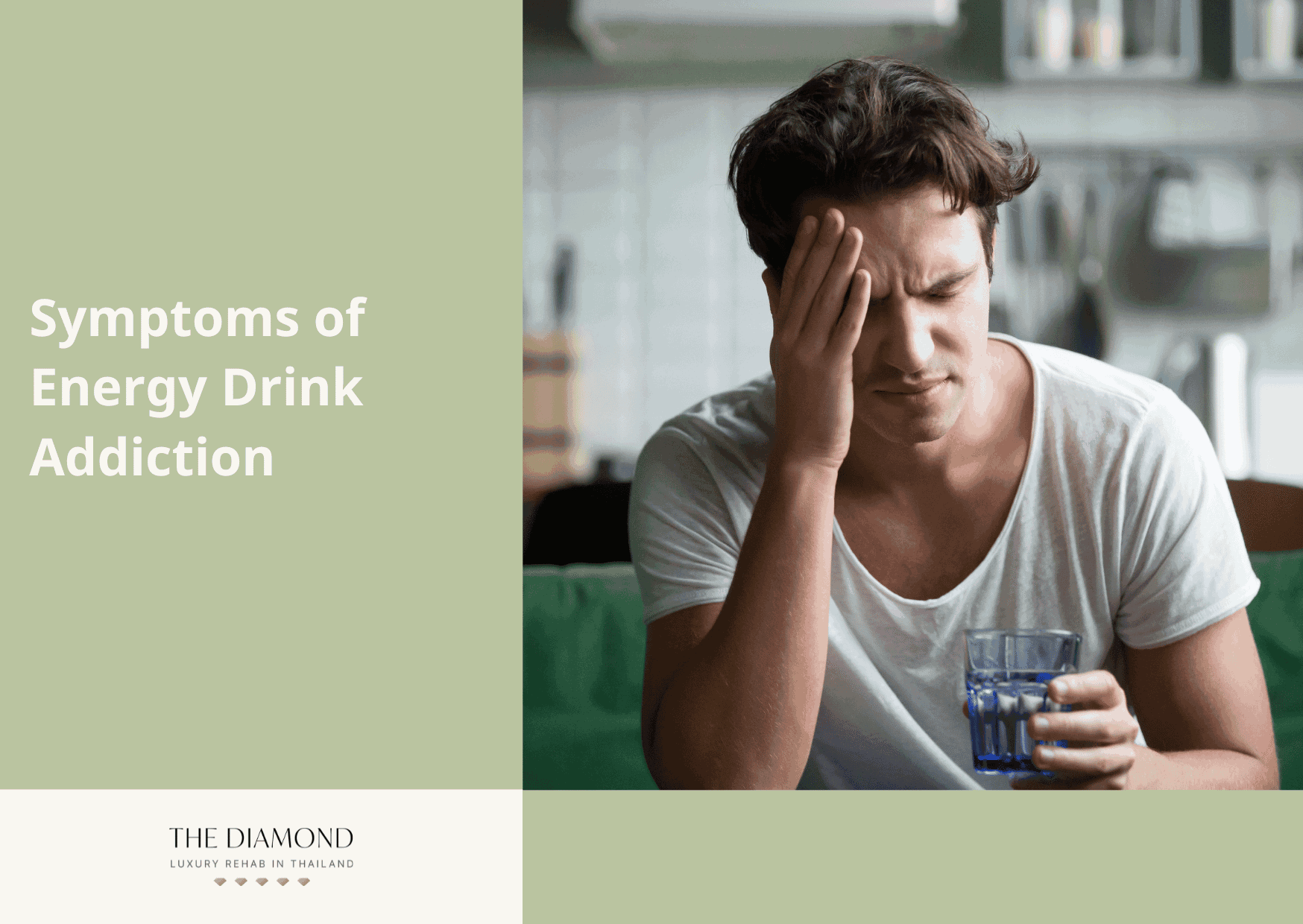
Symptoms of energy drink addiction withdrawal include drowsiness, caffeine-induced headache, constipation, lethargy, irritability, insomnia, difficulty concentrating, and nausea and vomiting.
Withdrawal from energy drinks may also cause symptoms such as anxiety, depression, brain fog, changes in heart rhythm including low blood pressure and heart palpitations, and flu-like symptoms (runny nose, blocked sinuses, and fever).
The abovementioned signs and symptoms occur primarily due to caffeine withdrawal. The body gets used to high levels of caffeine administered through energy drinks. As a person quits these beverages, the body enters into withdrawal mode. While it’s uncomfortable, withdrawal is necessary for the process of recovery.
What are the negative consequences of energy drink addiction?
The negative consequences of energy drink addiction can encompass various aspects of an individual’s life and well-being. Negative consequences of energy drink addiction include:
- High caffeine content that interferes with the sleep cycle
- Impaired productivity at work or school due to insufficient sleep
- Financial difficulties due to constant energy drink purchases
- Too much sugar can pave the way to various health problems
- Due to stimulant effects, energy drink addiction could lead to other substance use disorders
- Too much caffeine can cause various side effects
- Energy drink addiction could severely affect a person’s health because the safety of these beverages with long-term use is unclear
Other potential negative consequences of energy drink addiction are:
- Health problems
- Financial difficulties to support this addictive behavior (the sales of energy drinks in the US increased to nearly $14 billion by 2021, according to statistics on energy drink sales in the United States from 2017 to 2021 provided by Statista)
- Higher risk of developing other forms of substance use disorders
What is the unique relation between energy drink addiction and exercise addiction?
The unique relation between energy drink addiction and exercise addiction is in the seeking of euphoria through strong bursts of energy. Both exercise and these beverages boost energy levels that give a person a feeling of excitement. At the same time, a person with exercise addiction may use a lot of energy drinks to take their athletic performance to a new level. In fact, the use of energy and sports drinks is high among active people and athletes.
While the research on this subject is scarce, a 2012 study by Christiana Buxton and John E. Hagan published in the Journal of the International Society of Sports Nutrition found 62.2% of surveyed athletes consumed at least one can of energy drink a week. At the same time, 53.6% did it to replenish lost energy or to provide energy, improve performance, and reduce fatigue.
A person with an energy drink addiction consumes more than one can a week. Athletes who use these drinks from time to time aren’t addicted. However, this study does confirm the use of energy drinks among active men and women is high.
These types of addiction could go hand in hand in some cases. A person with energy addiction compulsively may excessively consume these beverages believing they are unable to perform their workouts properly or any other task.
At the same time, someone with exercise addiction could also start consuming too much energy drink in order to feed their addictive behavior. The body gets tired and loses energy, and these beverages could be a way to boost them.

